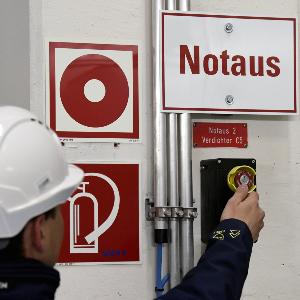The German economy: “A huge shadow cast by war“
22 Apr 2022
Professor Monika Schnitzer, economics expert at LMU, on the repercussions of the Ukraine conflict for the German economy.
22 Apr 2022
Professor Monika Schnitzer, economics expert at LMU, on the repercussions of the Ukraine conflict for the German economy.

Should deliveries of gas, coal, oil be discontinued, there would be significant impacts on the industry, says Monika Schnitzer. | © picture alliance / HARALD SCHNEIDER / APA / picturedesk.com
Professor Monika Schnitzer holds the Chair of Comparative Economics at LMU’s Faculty of Economics. She is a member of the independent German Council of Economic Experts, which has just published its latest Economic Outlook.
Professor Schnitzer, what is the verdict of the first Economic Outlook the Council has published since war broke out in Ukraine?
Monika Schnitzer: We predict that the German economy will expand by 1.8 percent this year. Compared to the 4.6 percent growth forecast presented in the Annual Report in November, this marks a sharp downward correction.
The first reason, which was not considered at the time, was the Omicron wave in winter. This, together with high energy prices, has weighed heavily on economic development. We had originally expected that the economy would now, at last, shift back into gear. But the war of aggression against Ukraine is casting a huge shadow over these prospects.
We are not likely to return to the pre-pandemic level of the end of 2019 until the third quarter of this year, and even then only assuming that energy prices remain high but that [gas and oil] deliveries are not suspended.
To what extent does the economic impact of the war in Ukraine differ from that of Covid-19?
During the pandemic, closures and delivery problems prompted an economic slump, but there was no fundamental change to the structure of the economy as such. It was obvious that, as soon as the restrictions were lifted, the economy would recover. Similarly, a temporary chip shortage like the one that arose from the coronavirus pandemic and that still exists, hinders automotive production but does not cast doubt on the whole branch of industry.
In the event that deliveries of gas, coal and oil are discontinued, all that would change because we would now have to expect significant impacts on the very structure of industry.
While only half of German households use gas for heating, it is also an input product for the chemical industry, for example, which is in turn a supplier to virtually all other industries. The suspension of gas deliveries would therefore affect the entire economy.Monika Schnitzer
How would a moratorium on deliveries of Russian energy affect the German economy?
It would substantially worsen the recession. But it is extremely difficult to forecast the extent to which that would happen, because there is no comparable previous event on the same scale that we could use as a basis for the most common forecasting models.
What we do have is a series of studies that model certain aspects of such crises – such as the loss of gas supplies or the economic consequences of high energy prices, including provision for the financial markets. To assess the overall impact, we would essentially have to add all these components together. And that could bring us to a five percent drop in gross domestic product – albeit with a considerable degree of uncertainty.
Which means that things could indeed turn out far worse: While only half of German households use gas for heating, it is also an input product for the chemical industry, for example, which is in turn a supplier to virtually all other industries. The suspension of gas deliveries would therefore affect the entire economy.
And there are a lot of production processes that you cannot simply stop and start up again at will: A melting tank used to produce glass ceramics, for instance, runs without stopping for about 20 years. If you stop it, it is broken, the capital investment is destroyed.
One event that springs to mind when we talk about the possibility of suspended gas deliveries is the oil crisis in the early 1970s, when the OPEC countries scaled back their oil production in response to the West’s support for Israel in the Yom Kippur War. The older ones among us will recall the “car-free Sunday” that was introduced back then because of this situation. Oil production was ramped up again a few weeks later. But high oil prices remained, which was one reason why greater emphasis was then placed on nuclear energy.
Looking back, we have been negligent in allowing ourselves to slip into dependency. Germany depends on Russia for about half of its gas and coal imports and about a third of its oil.Monika Schnitzer
From an economic perspective, what mistakes has Germany made in recent years with regard to Russia?
Looking back, we have been negligent in allowing ourselves to slip into dependency. Germany depends on Russia for about half of its gas and coal imports and about a third of its oil. Our dependency on gas is a big problem because the gas is supplied via pipelines. For alternatives such as liquefied natural gas (LNG), we do not yet have the infrastructure that would be needed to get the gas to where it is needed. Russian gas was attractive because it was inexpensive.
On the other hand, it was believed that military conflicts could be avoided by developing economic ties – by ‘change through trade’. Because Russia, too, is economically dependent on us, with a large portion of its budget funded by revenues from its energy exports.
But these assumptions proved to be wrong.
Putin accepts that the war will seriously affect Russia’s economy and will therefore be very expensive for his own people. Russia has for years been working to make its industry independent. Energy is produced using old steam turbines instead of modern, more efficient alternatives from abroad. In the event of a conflict, that leaves Russia more autonomous and less vulnerable to sanctions.
What do you think of the calls for an embargo?
As an economist, I can say something about the economic consequences of an embargo, and that alone is hard enough. In the event of an immediate embargo, we will probably have to expect a deep recession.
I am not an expert on the subject of whether an embargo would cause Putin to back down. That said, in light of the fact that Putin seems to have made himself very independent, I obviously have little confidence that it would. Weighing the risks of such an embargo for us against the chances of a faster end to the war in Ukraine and then making a decision is the job of the politicians.
Germany has to diversify and become less dependent on individual countries and companies from which we have hitherto sourced raw materials and input products.Monika Schnitzer
What should Germany do now on the economic front?
Germany has to diversify and become less dependent on individual countries and companies from which we have hitherto sourced raw materials and input products – and not only to avoid potentially being vulnerable to blackmail. The German automotive industry, for example, procures roughly half of its wiring harnesses from Ukraine. Now that this source is offline, the assembly lines in Wolfsburg [at VW] have come to a standstill.
In addition, there are certain goods that are also subject to security concerns. Official sources are now warning against some software products, such as antivirus programs from Kaspersky, a Russian company. I used to see the risk as less serious. Today, I would say that technological quality and price are not the only issues: The nationality of the company is also important – and whether that company’s government could misappropriate the product as a gateway for cyber-attacks.

“Germany has to diversify and become less dependent on individual countries and companies from which we have hitherto sourced raw materials and input products,“ says Monika Schnitzer. | © Jan Staiger
At LMU, Professor Monika Schnitzer concerns herself with microeconomic analysis of the knowledge society in general and of corporate innovation, competition and internationalization strategies in particular.
A holder of the Order of Merit of the Federal Republic of Germany, Schnitzer studied economics at the Universities of Cologne and Bonn and at the London School of Economics. She earned her doctorate and qualified as a professor at the University of Bonn.
Monika Schnitzer has also served as a visiting professor at Stanford University, Yale University, the University of California at Berkeley and Harvard University.